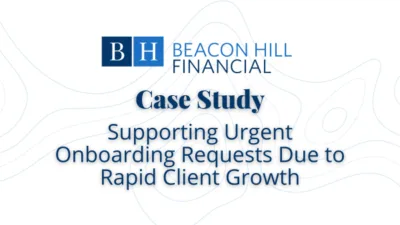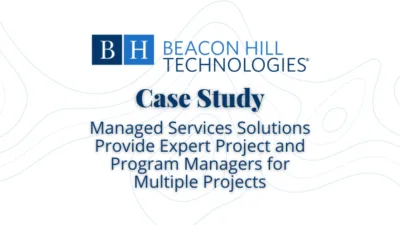BH Technologies® Case Study
Optimizing Engineering Processes and Vendor Oversight for a Leading Aerospace Client
Client Challenge
A leading American aerospace and defense corporation faced operational inefficiencies as it scaled up engineering efforts for critical avionics programs. The organization had built a strong technical team, but shifting industry funding and program demands led to resource constraints and process misalignment across multiple third-party vendors.
Key challenges included:
- Fragmented engineering workflows leading to inefficiencies in FPGA development and DO-254 verification processes.
- Lack of structured governance models for tracking vendor performance, cost control, and milestone alignment.
- Limited process transparency, requiring data-driven reporting and operational oversight for better decision-making.
- Need for scalable, cost-effective engineering workforce solutions to support ongoing mission-critical programs.
Strategic Approach
Beacon Hill Technologies worked with executive stakeholders to implement a structured framework for process optimization, governance, and operational efficiency. Our approach emphasized:
Engineering Process Optimization & Lean Transformation
- Conducted gap analysis of engineering workflows, identifying inefficiencies in FPGA development and verification processes.
- Applied Lean Six Sigma methodologies to reduce cycle times, eliminate redundant workflows, and streamline program execution.
- Designed a standardized process roadmap, aligning engineering milestones with program requirements and compliance mandates.
Governance & Vendor Performance Oversight
- Developed a structured vendor governance framework, integrating performance scorecards, KPI tracking, and risk mitigation protocols.
- Appointed a Program Governance Lead to oversee vendor operations, ensuring alignment with budget constraints and engineering timelines.
- Implemented real-time reporting mechanisms using customized dashboards and automated milestone tracking for greater transparency.
Scalable Workforce & Knowledge Retention Strategy
- Designed a flexible resource model, allowing the organization to scale engineering support as needed without overcommitting resources.
- Established a knowledge transfer framework, ensuring that outsourced expertise transitioned into in-house engineering teams to build long-term capability.
- Developed a training and change management program to ensure smooth adoption of process enhancements across engineering teams.
Results & Business Impact
- Reduced engineering cycle times and improved workflow standardization, increasing efficiency across avionics programs.
- Improved cost tracking and vendor performance, ensuring program budgets remained aligned with deliverables.
- Enhanced decision-making through real-time analytics, integrating data visualization and KPI dashboards to provide executive leadership with better operational insights.
- Established a scalable, repeatable governance model, creating a foundation for ongoing process optimization and regulatory compliance.
Conclusion
Beacon Hill Technologies delivered a structured, data-driven approach to process transformation, vendor governance, and engineering efficiency. Through a combination of Lean methodologies, real-time performance tracking, and scalable resource planning, the client achieved:
- Sustained operational efficiency in engineering execution
- Improved compliance with DO-254 and program governance frameworks
- Greater financial and vendor oversight for cost optimization
- A structured process model that supports ongoing scalability and innovation
By embedding a culture of continuous improvement and structured governance, the organization is now positioned to deliver high-performance avionics systems efficiently and cost-effectively while maintaining full program alignment.


